- Clone
- 5E7 (See other available formats)
- Regulatory Status
- RUO
- Other Names
- PR domain zinc finger protein 1, B lymphocyte-induced maturation protein-1, PRDM1, BLIMP1, PRDI-BF1, ZNFPR1A1, PRDM-1, BLIMP1
- Isotype
- Rat IgG2a, κ
- Ave. Rating
- Submit a Review
- Product Citations
- publications
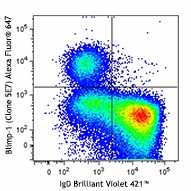
-

Balb/c spleen cells were cultured four days in presence of LPS, then were stained with CD45R/B220 PE and IgD Brilliant Violet 421™, followed by fixation and permeabilization with True-Nuclear™ Transcription Factor Buffer Set, and staining with Blimp-1 (clone 5E7) Alexa Fluor® 647 (top) or rat IgG2a, κ Alexa Fluor® 647 isotype control (bottom). -

| Cat # | Size | Price | Quantity Check Availability | Save | ||
|---|---|---|---|---|---|---|
| 150003 | 25 µg | 165 CHF | ||||
| 150004 | 100 µg | 375 CHF | ||||
Blimp-1, also known as PRDM1, is a 98 kD protein containing 5 Kruppel-type zinc finger domains. Blimp-1 represses the transcription factors BCL6 and c-Myc. It is the master regulator of terminal B cell differentiation and is also involved in the differentiation and homeostasis of T cells and natural killer (NK) cells.
Product DetailsProduct Details
- Verified Reactivity
- Mouse
- Antibody Type
- Monoclonal
- Host Species
- Rat
- Immunogen
- Amino acids 255-395 from mouse Blimp-1 fused with GST.
- Formulation
- Phosphate-buffered solution, pH 7.2, containing 0.09% sodium azide.
- Preparation
- The antibody was purified by affinity chromatography and conjugated with Alexa Fluor® 647 under optimal conditions.
- Concentration
- 0.5 mg/ml
- Storage & Handling
- The antibody solution should be stored undiluted between 2°C and 8°C, and protected from prolonged exposure to light. Do not freeze.
- Application
-
ICFC - Quality tested
WB - Reported in the literature, not verified in house - Recommended Usage
-
Each lot of this antibody is quality control tested by intracellular flow cytometry using our True-Nuclear™ Transcription Factor Staining Protocol. For flow cytometric staining, the suggested use of this reagent is ≤0.125 µg per million cells in 100 µl volume. It is recommended that the reagent be titrated for optimal performance for each application.
* Alexa Fluor® 647 has a maximum emission of 668 nm when it is excited at 633 nm / 635 nm.
Alexa Fluor® and Pacific Blue™ are trademarks of Life Technologies Corporation.
View full statement regarding label licenses - Excitation Laser
-
Red Laser (633 nm)
- Application Notes
-
NOTE: For flow cytometric staining with this clone, True-Nuclear™ Transcription Factor Buffer Set (Cat. No. 424401) offers improved staining and is highly recommended.
- Product Citations
-
- RRID
-
AB_2565617 (BioLegend Cat. No. 150003)
AB_2565618 (BioLegend Cat. No. 150004)
Antigen Details
- Structure
- Five Kruppel-type zinc finger domains, 98 kD.
- Distribution
-
Plasma cells, CD4+ and CD8+ effector/memory T cells, and natural killer cells.
- Function
- Terminal differentiation of B cells, effector/memory T cells, role in natural killer cells (NK) and T cell homeostasis, and repressor of BCL6 and c-Myc.
- Cell Type
- Plasma cells, T cells, NK cells, B cells
- Biology Area
- Cell Biology, Immunology, Transcription Factors
- Antigen References
-
1. Nakaki F, et al. 2013. Nature 501:222.
2. Crotty S, et al. 2010. Nat. Immunol. 11:114.
3. Zhao WL, et al. 2008. Blood 111:3867.
4. Climmino L, et al. 2008. J. Immunol. 181:2338.
5. Martins, G and Clarne, K. 2008. Annu. Rev. Immunol. 26:133. - Gene ID
- 12142 View all products for this Gene ID
- UniProt
- View information about Blimp-1 on UniProt.org
Related Pages & Pathways
Pages
Related FAQs
Other Formats
View All Blimp-1 Reagents Request Custom Conjugation| Description | Clone | Applications |
|---|---|---|
| Alexa Fluor® 647 anti-mouse Blimp-1 | 5E7 | ICFC,WB |
| PE anti-mouse Blimp-1 | 5E7 | ICFC |
| APC anti-mouse Blimp-1 | 5E7 | ICFC |
| Brilliant Violet 421™ anti-mouse Blimp-1 | 5E7 | ICFC |
Customers Also Purchased
Compare Data Across All Formats
This data display is provided for general comparisons between formats.
Your actual data may vary due to variations in samples, target cells, instruments and their settings, staining conditions, and other factors.
If you need assistance with selecting the best format contact our expert technical support team.
-
Alexa Fluor® 647 anti-mouse Blimp-1
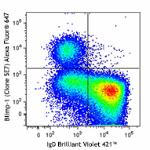
Balb/c spleen cells were cultured four days in presence of L... 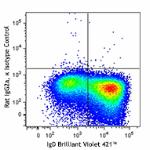
-
PE anti-mouse Blimp-1

C57BL/6 splenocytes were cultured for 4 days in the presence... -
APC anti-mouse Blimp-1

Balb/c splenocytes were cultured 3 days in the presence of L... -
Brilliant Violet 421™ anti-mouse Blimp-1

C57BL/6 splenocytes were cultured for 3 days in the presence...
 Login / Register
Login / Register 









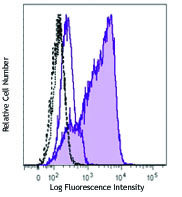
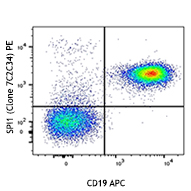
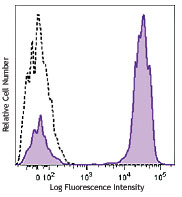
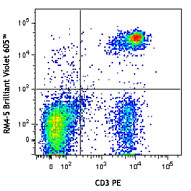



Follow Us